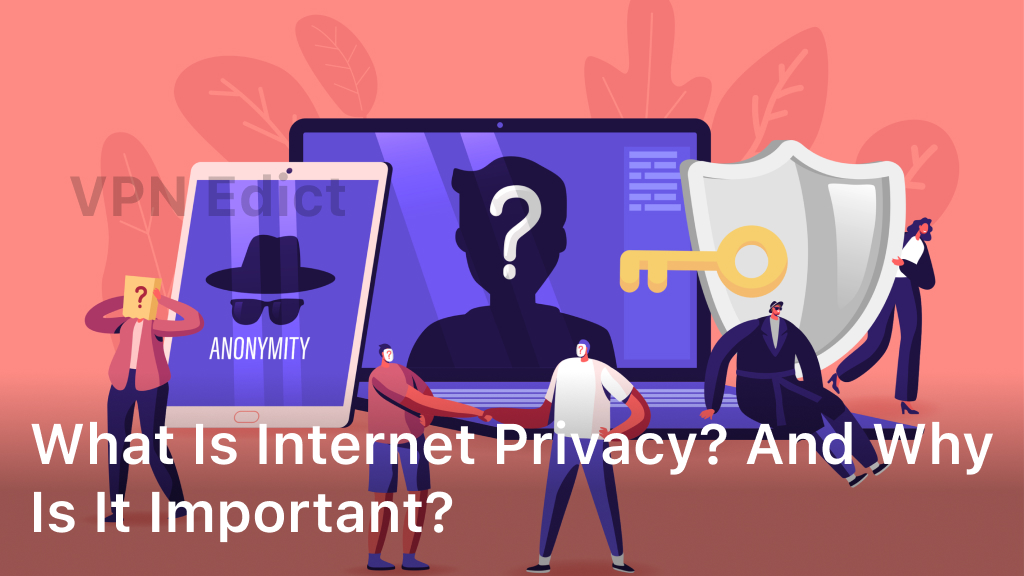What is Internet Privacy? And Why is it Important?
Welcome to our article on internet privacy. In today’s digital world, it’s crucial to understand what internet privacy means, why it’s important, and how to protect it. Internet privacy encompasses multiple aspects, including online security, data protection, personal information, online tracking, digital footprint, cybersecurity, and online privacy rights. With the proliferation of online activities, individuals must stay informed and take proactive measures to safeguard their personal information from potential threats. In the following sections, we will delve into the concept of internet privacy, its various implications, and the steps we can take to maintain our online privacy.

Understanding Internet Privacy
Internet privacy refers to the control individuals have over the collection, use, and dissemination of their personal information while using the internet. This includes the ability to limit access to personal data, prevent online tracking, and protect against cyber threats and data breaches.
In today’s digital world, it is essential to understand the implications of internet privacy for our online activities. By comprehending the concept of internet privacy, we can better understand the dangers and advantages associated with using the internet.
Internet privacy allows individuals to maintain control over their personal information, safeguard their online presence, and avoid the risks of identity theft, fraud, and other cyber threats. By putting in place measures to protect personal information and data, individuals can exercise their online privacy rights and remain secure in the digital age.
Ensuring Online Security
Online security is a critical aspect of ensuring internet privacy. It involves taking proactive measures to protect our personal information from cyber threats. There are various steps that individuals and organizations can take to safeguard their online presence.
Use Strong Passwords
Creating strong passwords is the first step to ensure online security. Passwords should be complex, containing a combination of uppercase and lowercase letters, numbers, and symbols. Additionally, it is advisable to avoid using the same password for multiple accounts and change passwords regularly.
Implement Firewalls
Using firewalls can help prevent unauthorized access to our devices and networks. Firewalls act as a barrier between our devices and the internet, monitoring incoming and outgoing traffic and blocking suspicious activity. It is essential to keep firewalls up-to-date to ensure maximum protection.
Stay Vigilant Against Cyber Threats
Staying informed about the latest cyber threats and adopting best practices is crucial to online security. Being vigilant against phishing attacks, malware, and social engineering tactics can help mitigate the risk of online attacks. It is also important to keep security software up-to-date and enable two-factor authentication.
By prioritizing online security, we can protect our personal information and reduce the risks of cyber threats. Consistent and proactive efforts towards online security are necessary to ensure internet privacy.
Protecting Personal Information
In today’s digital age, it is crucial to understand the importance of protecting personal information online. With data breaches and identity theft becoming more prevalent, it is essential to implement robust data protection practices to safeguard your privacy and minimize the potential harm.
One way to protect personal information is by being cautious about the information you share online. Avoid sharing sensitive information such as your social security number, bank details, or other personal identifiers unless it is necessary. Use discretion when sharing personal details on social media platforms or other websites.
Additionally, it is important to take necessary precautions such as using strong passwords, two-factor authentication, and keeping software up to date to prevent unauthorized access to personal information. By taking these measures, you can reduce the risk of data breaches and identity theft.
It is also important to understand the privacy policies of websites and apps you use. Ensure they have reasonable measures in place to protect your personal information. If you have any concerns, consider using privacy-enhancing tools to maintain privacy while browsing the internet.
Overall, ensuring data protection and safeguarding personal information is crucial for maintaining online privacy. By staying informed and prioritizing data protection practices, you can minimize your risk of becoming a victim of cybercrime and protect your personal information from unauthorized access.
Understanding Digital Footprint
As we navigate through the digital landscape, we leave behind digital footprints – a trail of data that reveals information about our online activities. These footprints can include browsing history, social media interactions, and even location data.
However, these footprints can also pose potential privacy risks, as they can expose personal information and affect our online reputation. Thus, it is crucial to be aware of our digital footprint and take necessary precautions to protect our online privacy.
By understanding our digital footprint, we can make informed choices about what we share online and how we manage our online presence. Additionally, taking steps such as using privacy settings and limiting the amount of personal information we share online can help minimize our digital footprint and reduce the potential risks associated with it.
The Impact of Online Tracking
In today’s digital age, websites and advertisers use online tracking to monitor our behavior and collect data for targeted advertising. This practice raises concerns about internet privacy as it can potentially expose our personal information without our consent.
Online tracking can take various forms, including cookies, web beacons, and device fingerprinting. These tools allow websites and advertisers to gather information about our browsing habits, search history, and online interactions.
While targeted advertising may seem convenient, it can also feel invasive and raise questions about how our personal information is being used. It’s important to understand online tracking and take steps to manage it to maintain control over our privacy.
Managing Online Tracking
There are several ways to manage online tracking, including using privacy-focused browser extensions, clearing browser history and cookies regularly, and adjusting privacy settings on social media and other online platforms.
Another option is to use a virtual private network (VPN) to encrypt your online activity and protect your personal information from being tracked. VPNs can provide an additional layer of security and privacy when browsing the web.
By understanding and managing online tracking, we can protect our personal information and maintain control over our digital footprint.
Conclusion
As we conclude, it is evident that internet privacy is a vital aspect of our online presence. It encompasses various areas such as online security, data protection, personal information, digital footprint, and online tracking.
To ensure our privacy is protected, it is important that we understand the potential risks and benefits of internet privacy. We need to prioritize online security and implement measures to safeguard our personal information from potential cyber threats. Additionally, by being aware of our digital footprint and online tracking, we can make informed decisions about our online presence.
Individuals must actively advocate for their online privacy rights and take proactive measures to safeguard their personal information in the digital age. By staying informed, we can continue to enjoy the benefits of the internet while ensuring our privacy is protected.
FAQ
What is internet privacy?
Internet privacy refers to the protection of personal information and online activities from unauthorized access, use, or disclosure. It involves the right to control and manage personal data, ensuring that individuals have the freedom to browse the internet without compromising their privacy.
Why is internet privacy important?
Internet privacy is important because it safeguards sensitive information, such as financial data, personal details, and browsing history, from falling into the wrong hands. It helps prevent identity theft, cyberattacks, and unauthorized surveillance. Internet privacy also ensures that individuals can maintain control over their online presence and make informed choices about how their data is used.
How can I ensure online security?
You can ensure online security by implementing various measures, such as using strong and unique passwords, enabling two-factor authentication, keeping your devices and software up to date, and avoiding suspicious emails or links. It’s also essential to use reliable antivirus software, enable firewalls, and exercise caution when sharing personal information online.
How can I protect my personal information online?
To protect your personal information online, you should be cautious about what you share on social media, use privacy settings to limit the visibility of your posts, and avoid sharing sensitive information with untrustworthy websites or individuals. Regularly reviewing and updating your privacy settings and being aware of the websites’ data collection practices can also help safeguard your personal information.
What is a digital footprint?
A digital footprint refers to the trail of data left behind by an individual while using the internet. It includes personal information, online activities, and interactions, such as social media posts, search engine queries, and online purchases. Understanding your digital footprint is important as it can impact your online reputation and privacy.
Why is online tracking a concern for internet privacy?
Online tracking involves the collection of data about an individual’s online behavior, usually for targeted advertising purposes. It can result in the accumulation of a vast amount of personal information, compromising privacy. Being aware of online tracking and taking steps to manage it, such as using browser extensions or opting out of data collection, can help protect your privacy online.




